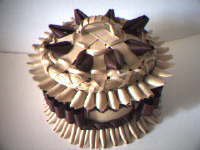
I asked my great-aunt what object in her personal possession sparked significant memories of her life. She chose to include a splint ash basket she made from materials she had gathered from the land. The splint ash basket represents respect, knowledge, and understanding of her culture and traditions, and respect for the gifts from the Creator. She was taught the art of basketry by her mother and grandmother, and she would carry on this tradition of basket-making throughout her life and pass her knowledge on to me.